
Shirley Vivian Teresa Brittain Williams, Baroness Williams of Crosby, was a British politician and academic. Originally a Labour Party Member of Parliament (MP), she served in the Labour cabinet from 1974 to 1979. She was one of the "Gang of Four" rebels who founded the Social Democratic Party (SDP) in 1981 and, at the time of her retirement from politics, was a Liberal Democrat.
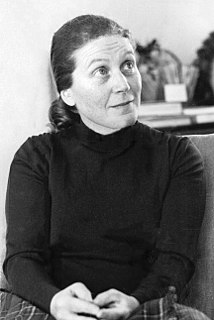
Svetlana Iosifovna Alliluyeva, later known as Lana Peters, was the youngest child and only daughter of Soviet leader Joseph Stalin and his second wife Nadezhda Alliluyeva. In 1967, she caused an international furor when she defected to the United States and, in 1978, became a naturalized citizen. From 1984 to 1986, she briefly returned to the Soviet Union and had her Soviet citizenship reinstated. She was Stalin's last surviving child.

In politics, a defector is a person who gives up allegiance to one state in exchange for allegiance to another, in a way which is considered illegitimate by the first state. More broadly, it involves abandoning a person, cause, or doctrine to which one is bound by some tie, as of allegiance or duty.
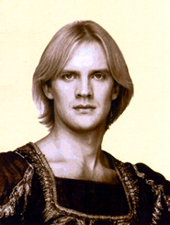
Alexander Borisovich Godunov was a Russian-American ballet dancer and film actor. He was a member of the Bolshoi Ballet and became the troupe's Premier danseur. In 1979, he defected to the United States, and began working as a supporting actor in Hollywood films. He had several small, but prominent roles in films such as Witness and Die Hard.

Jay Lovestone was an American activist. He was at various times a member of the Socialist Party of America, a leader of the Communist Party USA, leader of a small oppositionist party, an anti-Communist and Central Intelligence Agency (CIA) helper, and foreign policy advisor to the leadership of the AFL-CIO and various unions within it.

Lionel Sharples Penrose, FRS was an English psychiatrist, medical geneticist, paediatrician, mathematician and chess theorist, who carried out pioneering work on the genetics of intellectual disability. Penrose was the Galton professor of eugenics (1945–1965), then professor of human genetics (1963–1965) at University College London, and later emeritus professor.
The Borodin Quartet is a string quartet that was founded in 1945 in the then Soviet Union. It is one of the world's longest-lasting string quartets, having marked its 70th-anniversary season in 2015.
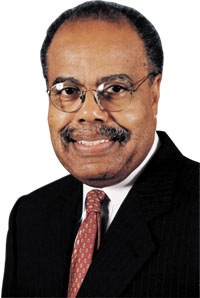
Donald Franchot McHenry is a former American diplomat. He was the United States Ambassador and Permanent Representative to the United Nations from September 1979 until January 20, 1981.
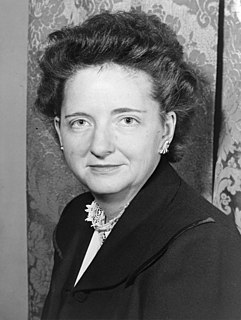
Elizabeth Terrill Bentley was an American spy and member of the Communist Party USA who served the Soviet Union from 1938 until 1945. In 1945, she defected from the Communist Party and Soviet intelligence by contacting the FBI and reporting on her activities.
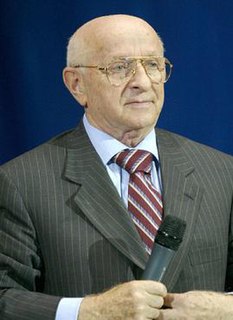
Alexander Yakovlevich Gomelsky was a Soviet and Russian professional basketball player and coach. The father of Soviet and Russian basketball, he was inducted into the Naismith Memorial Basketball Hall of Fame in 1995 and the FIBA Hall of Fame in 2007.
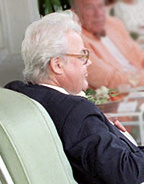
Arkady Nikolayevich Shevchenko was a Soviet diplomat who was the highest-ranking Soviet official to defect to the West.

Russian Americans are Americans of full or partial Russian ancestry. The term can apply to recent Russian immigrants to the United States, as well as to those who settled in the 19th-century Russian possessions in northwestern America. Russian Americans comprise the largest Eastern European and East Slavic population in the U.S., the second-largest Slavic population generally, the ninteenth-largest ancestry group overall, and the eleventh-largest from Europe.
Stanislav Alexandrovich Levchenko is a former Russian KGB major who defected to the United States in 1979. He obtained U.S. citizenship in 1989.

The Soviet Union covertly operated the world's largest, longest, and most sophisticated biological weapons program, thereby violating its obligations as a party to the 1972 Biological Weapons Convention. The program began in the 1920s and lasted until at least September 1992 but has possibly been continued by Russia after that.

Foy David Kohler was an American diplomat who was the United States Ambassador to the Soviet Union during the Cuban Missile Crisis.

Yuri Alexandrovich Bezmenov, was a Soviet journalist for RIA Novosti and a former PGU KGB informant who defected to Canada.
Victor Norris Hamilton was an American cryptologist who defected to the Soviet Union in 1963. He was discovered in a mental hospital in Russia in 1992, where he had been for 20 years.

In September 1960, two U.S. National Security Agency (NSA) cryptologists, William Hamilton Martin and Bernon F. Mitchell, defected to the Soviet Union. A secret 1963 NSA study said that: "Beyond any doubt, no other event has had, or is likely to have in the future, a greater impact on the Agency's security program."














